Tiruppur: Tattered clothes, broken slippers, and a small bag—these were the only things that Vijay Kumar brought with him when he came to Tiruppur in 2009 from Bihar’s Vaishali district.
Today, he has transcended the tag of a “Hindi migrant worker” and become an entrepreneur-owner of a cloth printing unit himself in the Tamil Nadu textile export hub. He isn’t the only one. Hundreds of migrant workers have become entrepreneurs over the last decade. They call it “Tiruppur ka jadoo”. This trend is particularly remarkable given the growing anxiety and discomfort among Tamils that workers from the north are taking over their jobs. Now, some of the same workers who are lampooned with labels such as “paani poori”, “bhaiyya”, and “Hindi-karans” are also generating jobs.
Some even hire Tamil workers in their thriving production units. This gradual shift upends popular notions about labour migration, the so-called North-South divide, economic mobility, and cultural assimilation.
Many of these migrant entrepreneurs have seamlessly adapted to the local culture. They speak fluent Tamil, savour filter coffee, and lounge in crisp white veshtis (dhotis). At Kumar’s textile unit, a portrait of Lord Murugan, garlanded with fresh jasmine, adorns the wall. It’s flanked by a Tamil calendar with dates annotated in blue ink. Even Kumar’s English now has a noticeable Tamil lilt.
The 30-year-old, who ended his formal education after completing class 10, calls himself a “self-made entrepreneur”. After 15 years in Tiruppur, of which seven were spent as a worker in various textile units, he now employs 10 fellow Biharis in his own cloth printing business.
The future belongs to the migrant workers from UP and Bihar.
-Sivakumar, state president, All-India Organisation for Small & Micro Industries
For him, adapting to the new culture wasn’t the biggest hurdle. It was peer pressure from his old friends. He wanted to set down new roots in Tamil Nadu, but they saw it as a stopgap, he said.
“My North Indian friends didn’t really think much about their futures,” Kumar recounted. “They were happy to keep working as migrant labourers and even made fun of me for speaking Tamil. But I had bigger dreams.”
Tiruppur has claimed the title of a ‘Make in India’ knitwear production and export hub even before Prime Minister Narendra Modi popularised the term. It is the big entrepreneurial dream city for small town North Indians. For decades, migrants from Uttar Pradesh, Bihar, Jharkhand, and Odisha have flocked here to work as migrant workers of production units owned by Tamils. But now some of them are rising up in the pecking order with their own micro and small textile units. They say that Tiruppur makes their upward mobility possible. For Tamils, it is the state’s “progressive work culture and lack of home-grown labourers” that has opened doors for the migrants.
“Those who have skills and aspirations to do something big are becoming entrepreneurs and Tamil society is not blocking their dreams,” said GR Senthilvel, secretary, Tiruppur Exporters and Manufacturers Association (TEAMA).
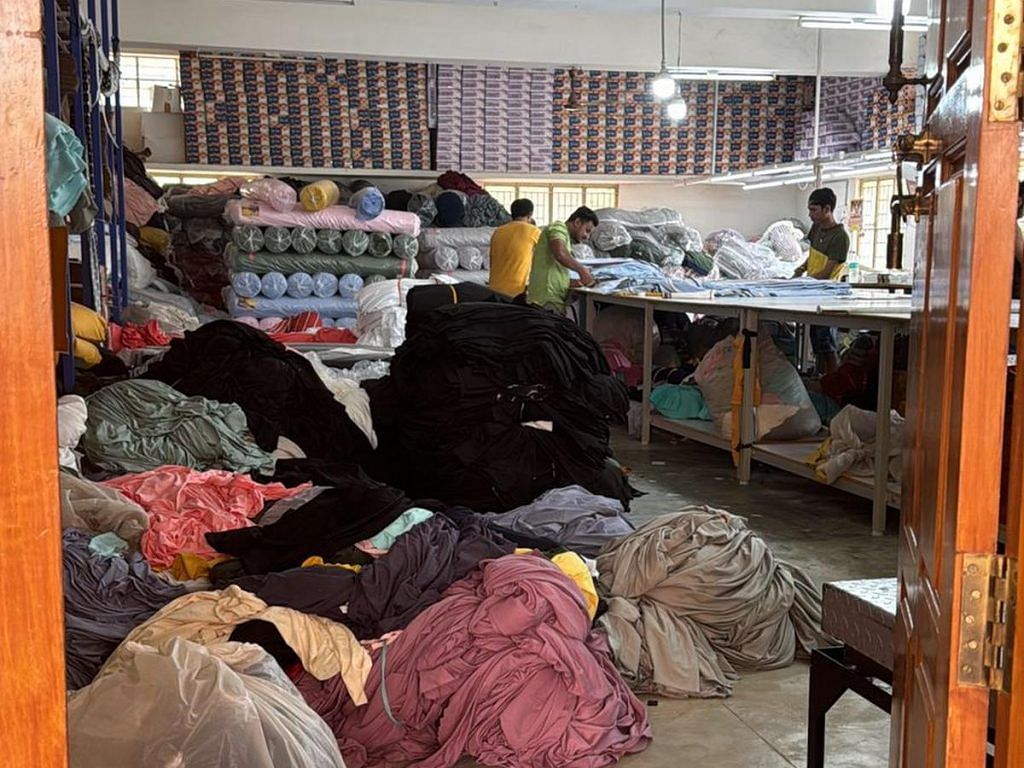
Tiruppur’s rise as a global knitwear powerhouse mirrors the gradual emergence of its migrant business community. Over the course of five decades, it has become a major supplier for global fashion brands such as Nike, Adidas, and H&M, accounting for 54.2 per cent of India’s textile exports in 2022. Once known for cotton farming and yarn production, the town switched to knitwear hosiery manufacturing in the 1970s, with farmers becoming owners of small textile units. This change coincided with the demand for affordable clothing both domestically and internationally.
In the 1980s, the town witnessed the arrival of businesspersons from Gujarat and Rajasthan who set up their textile units. It wasn’t until the 1990s, when the migrant workers started to trickle in.
It was the decade of rapid industrial and economic growth in Tamil Nadu. Ford Motors set up its factory in 1995 outside Chennai, sending a signal to the rest of the world that Tamil Nadu was open for business. Backed by an efficient administration, political will, and focus on ease-of-doing-business, Tiruppur flourished in the brave new flat world.
“If you have skills, we will welcome you—that is our mantra. It doesn’t matter where you are from, to which caste you belong, and which religion you practice. Tamil society welcomes people who want to work,” said Senthilvel.
Migrants reportedly make up about around half of the 6 lakh workers at the town’s roughly 10,000 apparel units. And Tiruppur needs them as much they need its opportunities.
“Tiruppur is in need of migrant labourers because its own population has moved to places like Singapore, Europe, and the USA. There are hardly any Tamil workers,” Senthivel said. “So, when migrant people work here and contribute to our economy, we also want them to grow. We are happy about that.”
Over the past decade, roughly 10 per cent of migrant workers have become business owners, though most are still in their “initial phase”, said M Sivakumar of the All-India Organisation for Small & Micro Industries.
Also Read: IISc deep tech startups are pushing India into elite league. Baby firms with big ambitions
Language as a stepping stone
Arriving in Tiruppur as a teenager with just Rs 300 in his pocket, Kumar left behind his family of four—parents and two brothers— in Bihar’s Vaishali district. His immediate concern was to earn enough to send money back home.
“My parents were getting old and farming was not sufficient to make our ends meet,” said Kumar. The family owned 2 acres of land, but his mother’s health was declining and his father struggled to juggle the roles of farmer and caretaker.
Desperate to help his family, Kumar started scouting for opportunities. He learned about Tiruppur through friends from his village who were already working in the textile units. Without thinking too much about it, he packed his meagre belongings and headed to the opposite end of the country.
Although all my clients are Tamils. It’s easier to work with a Bihari. There is an unspoken understanding and they are very hardworking. They have seen poverty and they are ambitious
-Vijay Kumar, migrant worker-turned-entrepreneur
At first, Kumar got a culture shock. His first employer was a 60-year-old Tamil man, and the language barrier was a huge challenge. In response, Kumar joined Tamil language classes near the Tiruppur railway station. He wasn’t alone in his pursuit. The classes, run as a part-time enterprise by a 50-year-old Tamil computer instructor, attracted several migrant workers from Uttar Pradesh and Bihar, all eager to learn.
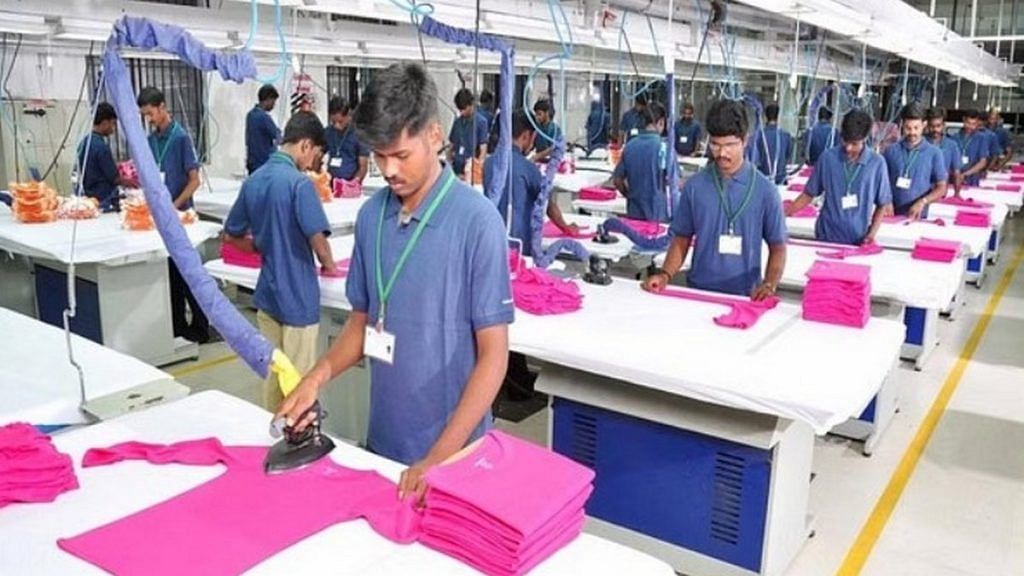
For Kumar, mastering the language was the first step to establishing himself in Tamil society.
“I distanced myself from my North Indian friends and befriended Tamils to improve my language skills,” he said. Initially, he would fumble and find it difficult to form coherent sentences but after consistent practice at home, interacting with the local residents, and watching Tamil news channels and serials, he eventually got the knack of it. Within three months, he was chatting fluently in Tamil. “It made me feel at home,” he said.
Kumar isn’t stopping at Tamil. He now knows language is the route to new worlds. And English is next in sight because he wants to expand his business and enter the export market. Every day, Kumar spends an hour or two picking up tips from YouTube tutorials. His two sons, who attend an international school and are fluent in both Tamil and English, also help him practice. When he speaks English, he sounds like a true blue Tamilian. “Tamil Nadu does that to you,” Kumar said, laughing loudly.
Unlike some migrant business owners who stick to their own circles, 50-year-old Ram Babu Singh from UP’s Deoria identifies more strongly with Tamil culture than his own Hindi heartland roots.
Labourer to business owner
Kumar’s ascent didn’t come overnight. It was a gradual climb, rung by steep rung.
In his first job in the Tiruppur, he had to scrape by on just Rs 100 for an eight-hour workday. It was a new, unfamiliar world. Loneliness gnawed at him even though he shared a room with two other North Indians. They too slogged at textile units, saving penny after penny to send home.
When Kumar received his first salary, he brought a white silk South Indian saree for his mother and a typical red-bordered Tamil dhoti for his father.
For three years, Kumar put his nose to the grindstone at the printing department of the textile unit. Once he felt confident in his abilities, he took a leap of faith and became a freelance contractor. This involved renting a fabric-printing machine and lobbying for work from various textile units. It was a demanding yet rewarding experience, allowing him to refine his skills and build a network of contacts among local manufacturers.
If you have skills, we will welcome you—that is our mantra. It doesn’t matter where you are from, to which caste you belong, and which religion you practice. Tamil society welcomes people who want to work
-GR Senthilvel, secretary, TEAMA
However, Kumar yearned for something more. The catalyst for change came in 2017 when an angry Tamil client publicly berated him for not printing designs carefully enough on a T-shirt.
“The client said, ‘this is not your company, that’s why you are doing a rushed job. When you own a company, you will realise’,” Kumar recalled. “I felt humiliated. But that night, I thought, why can’t I own a business? The next day, I went to look for a rented space to open my own unit.”
Getting the idea off the ground took a few months. Kumar sought financial support from friends and also took out a bank loan to purchase the necessary machinery. Finally, in 2018, his dream materialised and he inaugurated his small t-shirt printing unit on the outskirts of the city.
The inauguration day was filled with joy and pride. His parents came all the way from Bihar to celebrate it with him. The factory walls were adorned with balloons and buntings, Kumar’s mother conducted a traditional prayer, and a Tamil priest performed auspicious rituals. Even the Tamil landlord who had rented out the factory space joined the festivities.
Seven years later, the decorations still hang from the factory ceiling, a constant reminder of Kumar’s first step towards his entrepreneurial dream. What began with two machines and four workers has now flourished into a unit with five machines and a 10-person workforce.
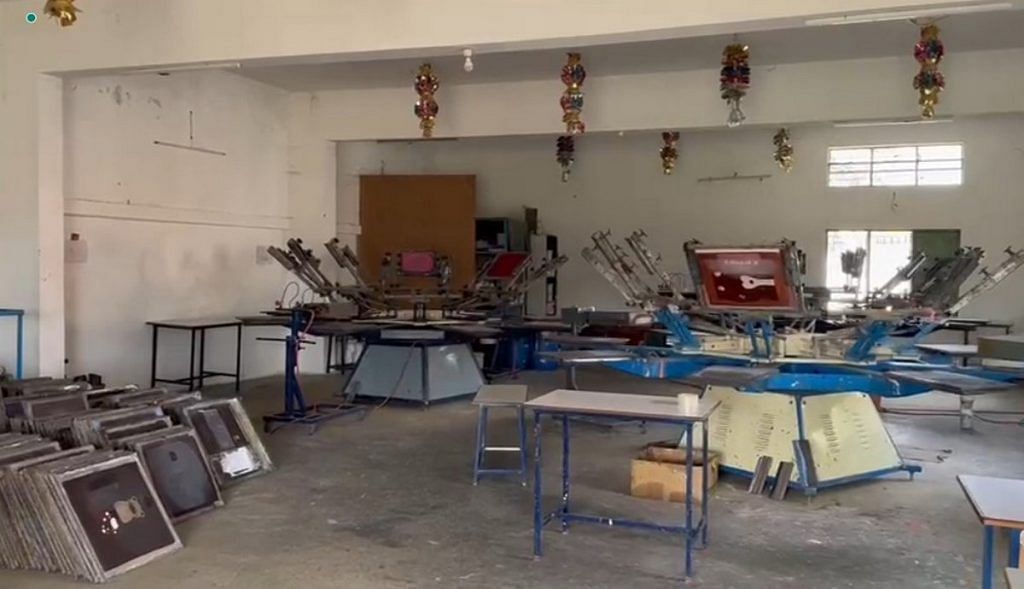
At the textile unit, giant machines are placed along the stacks of unstitched clothes. Years in the industry have equipped Kumar with valuable insights that inform his own business decisions. He points out that Koreans favour baggy clothes with simple prints, Europeans gravitate towards neutral designs, and Americans prefer t-shirts with text.
Business is doing well. Kumar has bought a piece of land in Tiruppur, acquired a silver Alto car, and is planning to build his own house in 2024. He has also bought a scooter, his preferred mode of transportation between his home and the unit. In Tiruppur, he has built a life with his wife and two children. While his parents visit frequently, they prefer to stay in Bihar.
“I pay Rs 16,000 as rent for the knitwear printing unit and Rs 10,000 for my home. And after paying the salaries to the workers, I am able to save Rs 2 lakh per month,” Kumar said.
Upward mobility has changed Kumar’s lifestyle, with some effects being less desirable than others. He is currently on a weight-loss regime with a dietician and has shed 15 kg in the past three months, going from 90 kg to 75 kg. He aims to lose another 5 kg.
“I have been asked to eat healthy food, lots of water and fruits. These days I prefer idli-dosa over North Indian food because it’s more healthy,” he said. To avoid hunger pangs, he drinks coconut water twice a day and runs 3 kilometres every morning. His Peter England shirts and Levis jeans are fitting better. But he is not content yet. He wants to open a full-fledged cloth manufacturing unit and is already making plans.
‘Future belongs to UP wallahs and Biharis’
Hundreds of migrants are weaving their entrepreneurial success stories in Tiruppur, but they are doing it one stitch at a time, raising their profiles slowly. Over the past decade, roughly 10 per cent of migrant workers have become business owners, though most are still in their “initial phase”, according to M Sivakumar, state president of the All-India Organisation for Small & Micro Industries.
While a small number of migrant entrepreneurs run knitwear manufacturing units, the vast majority have begun with units producing essential services for garment factories, such as printing, cutting, sewing, and so on. But Sivakumar predicts big changes on the horizon.
“There is a noticeable shift now. In the next phase, we are expecting migrant entrepreneurs to invest in the cloth manufacturing units,” he said. “The future belongs to the migrant workers from UP and Bihar.”
Sivakumar points out that the paucity of Tamil workers in the industry presents an advantage for migrant entrepreneurs. “They can easily recruit workers from their home states,” he said. “They know the pulse of their states and that’s why they are going step by step.”
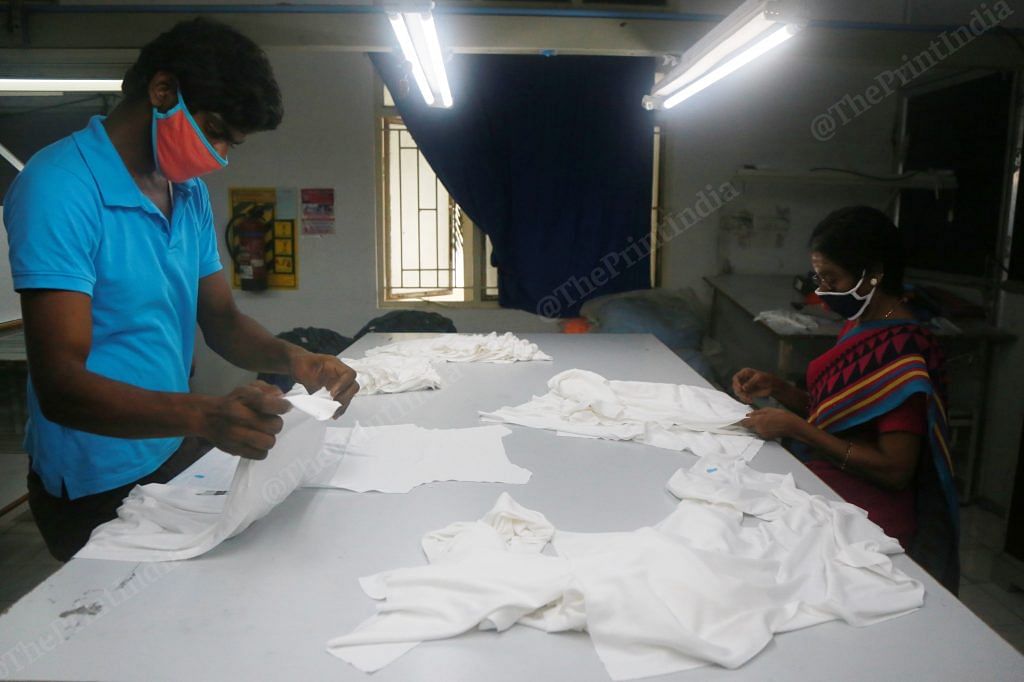
Kumar exemplifies this approach. All his workers are from Bihar, and he has established effective methods for getting the best out of them. He provides wages of Rs 900-1,200 for eight hours of work and even provides financial assistance to his employees’ families when needed.
He claims that Tamil workers are more “ziddi” (stubborn) and “handle karna mushkil ho jata hai” (It’s difficult to get work out of them).
“Although all my clients are Tamils. It’s easier to work with a Bihari. There is an unspoken understanding and they are very hardworking,” Kumar said. “They have seen poverty and they are ambitious. They want to do big things in life.”
I trust Tamil people with work as they are sharp and business-minded. And they can deal better with clients as they know the language
-Ram Babu Singh, Tiruppur business owner
However, Kumar has no trouble getting along with his clients, most of whom are Tamil garment-unit owners with whom he built up a rapport during his days as a contractor. Now, they trust only him with printing, sending him batches of unstitched clothes for the job, he said. Kumar proudly attributes his success to his USP: a trifecta of competitive rates, client goodwill, and high-quality work.
To pull it all off, he wears many hats, juggling roles as owner, salesperson, and marketer. He meets clients daily, presenting his best samples and persuading them to get their clothes printed at his unit. Once he returns the finished garments, they are exported to the global market.
Clinging to roots
Tiruppur’s Khaderpet market overflows with readymade garments. Clothes drape every available surface—on shop shutters, displayed in window panels, and stacked high inside stores.
Amid this colourful chaos stands a small shop owned by 30-year-old Dinesh Pareek, who came to Tiruppur from Rajasthan in 2010. After five years working in the stitching department of a clothing manufacturer, Dinesh made the switch to business. Now, he and his brother run a clothing manufacturing unit on the city’s outskirts, selling their creations from their Khaderpet shop.
Despite their success, however, Dinesh admits to feeling like an outsider. Even in the beginning, he deliberately sought work with Hindi-speaking owners from Gujarat and Rajasthan. He finds it difficult to “trust” Tamils because of the perceptions some hold of North Indians as “job-grabbers”. He prefers to stay in a cocoon with others who speak the same language and share the same culture.
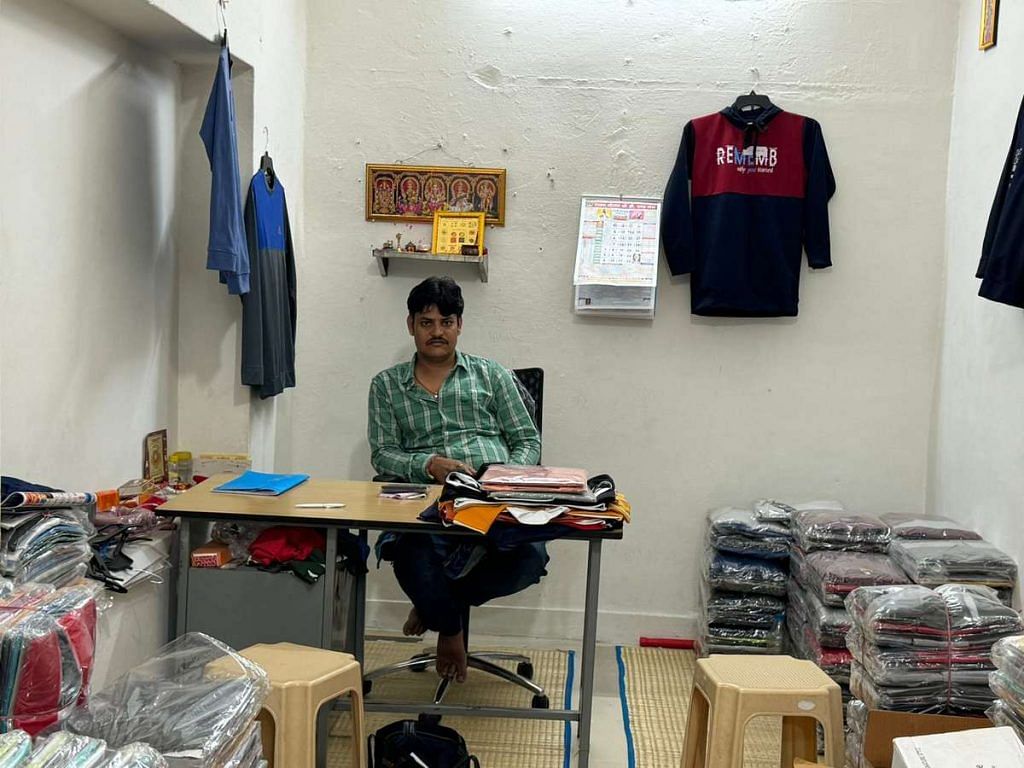
Old habits and affiliations remain even with those who have assimilated more with Tamil society, like Kumar.
On a recent morning at Kumar’s unit, workers quickly cleared away stacks of unstitched clothes and stickers scattered on the floor among the giant printing machines. They were wrapping up work to attend Prime Minister Narendra Modi’s public meeting in Tiruppur. Kumar had granted his employees half-day leave specifically for this.
For Kumar, PM Modi’s presence in Tiruppur is important signal of the town’s growing importance to the BJP’s national campaign. At a personal level, Modi resonates deeply with him and his life story serves as a source of inspiration — making Kumar believe that he too can achieve big feats in life. Watching Modi’s rally in Tiruppur and hearing him speak in Hindi was exhilarating, he said. Kumar could not attend in person since he had to attend to a sick acquaintance, but he watched the rally on the phone and then again on TV.
With the PM stating that the Centre had allocated more funds to Tamil Nadu’s welfare in the last ten years than any other government, Kumar said he’s sure that his future in Tiruppur is secure.
Also Read: Morbi is India’s undisputed tile champion. Now this Gujarat town is eyeing China’s crown
‘Tamilian’ by choice
Unlike some migrant business owners who stick to their own circles, 50-year-old Ram Babu Singh from UP’s Deoria identifies more strongly with Tamil culture than his own Hindi heartland roots. His mid-sized clothing factory is staffed mostly by Tamils.
“It helps me save overhead costs,” said Singh, sitting in his air-conditioned conference room. “If you hire someone from Bihar and Uttar Pradesh, you have to look after their accommodation and other facilities. You have to handhold them.”
Although he acknowledged the hard work and crucial role migrant workers play in his business operations, Singh expressed a particular kinship with Tamils.
“I like their simplicity,” he said. “You can’t judge them by the clothes they are wearing. Rich or poor — a dhoti and shirt is universal. By blood I am a UP wallah, but jaisa desh vaisa baes (as the place, so the garb).”
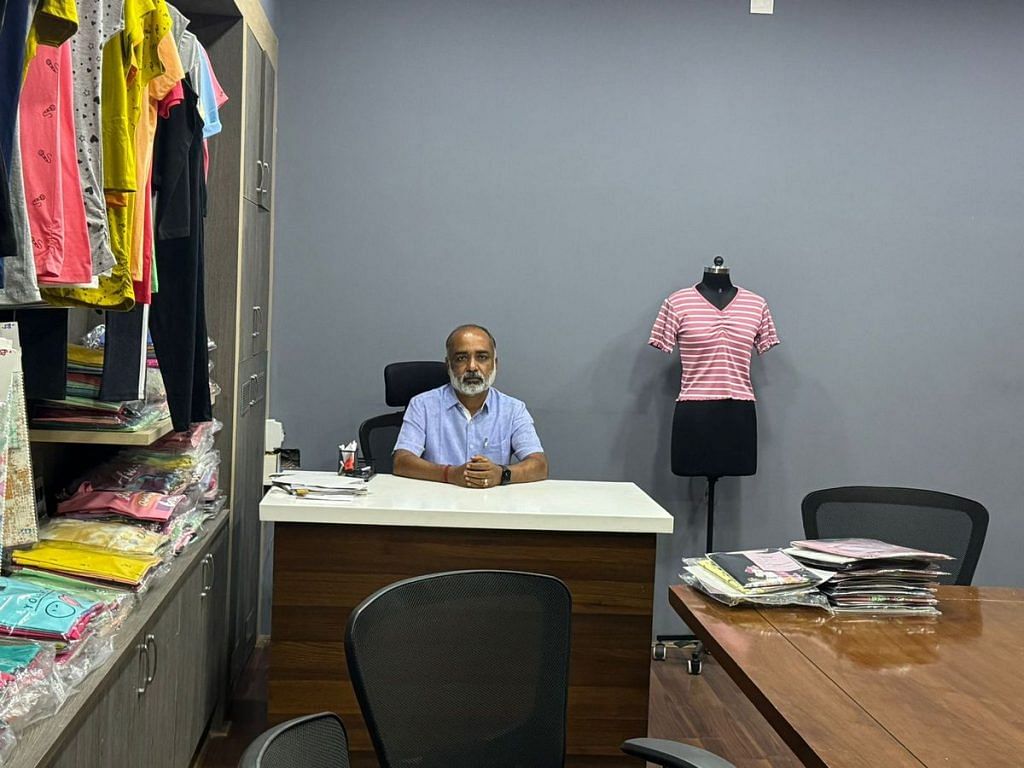
He prioritises employing Tamils in administrative and business-related roles. “I trust Tamil people with work as they are sharp and business-minded. And they can deal better with clients as they know the language,” he said. “Besides, I also want to give back to the society that supported me.”
Singh owns a four-story house in Kongu Nagar, complete with glass windows, CCTV cameras, and an elevator. The ground floor serves as his office, where he hosts meetings with clients from across India. The conference rooms feature bright lights, air conditioning, round tables. A female mannequin draped in a skirt and shirt graces his office. The main hall bustles with activity: a designer working on a logo, and two accountants counting samples. Singh converses with them all in rapid, fluent Tamil.
After moving to Tiruppur in 1995, he spent the first few years as a daily wage worker at a textile unit, earning a few hundred rupees a day. Today, his company boasts a turnover of Rs 10 crore.
“Had I not moved to Tiruppur, I would have been in Uttar Pradesh, struggling to make ends meet,” Singh said, smiling. “I have reached here because Tamil people accepted me and helped me grow.”
(Edited by Asavari Singh)


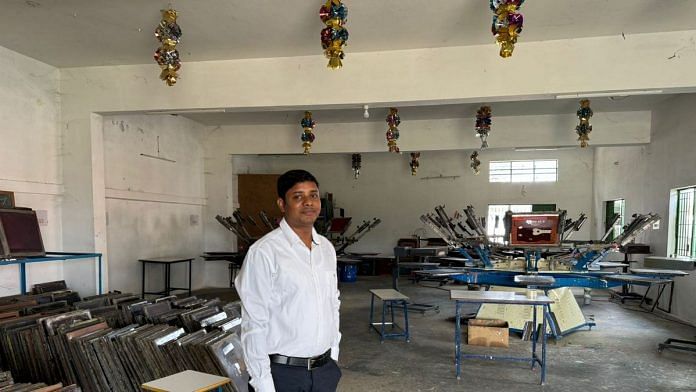

good job aall the best
A day will come when people from Hindi heartland will grab everything from Tamilians and would try to kick them out by using muscle power with the help of their respective fellow state people.